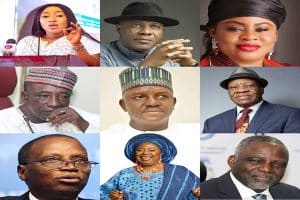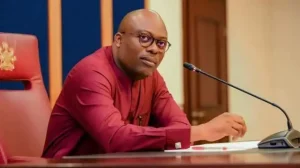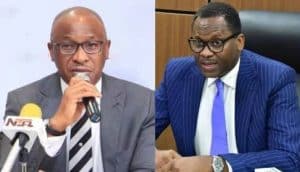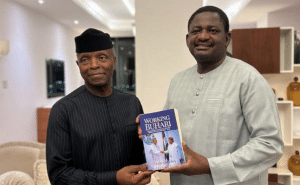Since the advent of civilian rule in 1999, marking the beginning of the Fourth Republic, Nigeria’s political landscape has been rife with numerous dramatic events, including the abrupt sacking and dismissal of ministers.
This trend, spanning various administrations, has become a notable feature of the country’s political dynamics.
From the tenure of ex-President Olusegun Obasanjo to Umaru Yar’Adua, followed by Goodluck Jonathan and Muhammadu Buhari, and now under President Bola Tinubu, each administration has witnessed the dismissal of certain ministers.
While some of these sackings were linked to scandals and controversies, others were part of broader cabinet reshuffles or overhauls.
These ministers, coming from diverse backgrounds and holding various portfolios, found their tenures abruptly ended for different reasons.
Journalist Alao Abiodun has compiled a comprehensive list of these ministers, outlining the circumstances and reasons behind their dismissal since the start of the Fourth Republic.
1. Barth Nnaji – Contrary to the impression created by the then presidency under Goodluck Jonathan that the then Minister of Power, Barth Nnaji, resigned from office on his own volition, Nnaji was tactically forced to resign following a gale of allegations linking him with attempts to subvert the bidding process for the sale of Afam Power plant.
Former President Jonathan was said to have asked the minister to resign rather than sack him, to save his administration the monumental embarrassment such an action could generate.
2. Michael Aondoakaa – Aondoakaa was appointed Attorney-General and Minister of Justice by late president Umaru Musa Yar’Adua on July 26, 2007.
In 2010, he was removed in controversial circumstances by Goodluck Jonathan, the acting president at the time.
3. Fabian Osuji – Osuji was dismissed by President Olusegun Obasanjo in March 2005 following his indictment by the Economic and Financial Crimes Commission (EFCC) for allegedly offering N55 million ($400,000) in bribes to the National Assembly to pass an inflated budget.
4. Stella Oduah – Oduah was sacked because of the various controversies and scandals trailing her.
Oduah was removed in February 2014 as the Minister of Aviation by former President Goodluck Jonathan over corruption allegations.
Subsequently, the Economic and Financial Crimes Commission on December 17, 2020, filed 25 counts accusing Oduah and the eight others of money laundering.
5. Prof. Adenike Grange – Prof. Adenike Grange and the then minister of state in the Ministry of Health, Gabriel Aduku bowed to pressure and bade an unwilling farewell to the cabinet of President Umaru Musa Yar’Adua over a N300m scam.
She was investigated by the Economic and Financial Crimes Commission (EFCC) and stood trial.
She claimed that she had been misadvised by her directors. The President had reportedly directed that all unspent money in the budget be returned but it was allegedly shared by officials of the Health Ministry as bonuses.
She resigned from office on 26 March 2008.
6. Betta Edu – Embattled Minister of Humanitarian Affairs, Betta Edu was suspended over alleged money laundering.
Edu was under heavy criticism after a memo surfaced where she directed the Accountant-General of the Federation, Oluwatoyin Madein, to transfer N585 million to a private account owned by one Oniyelu Bridget, who the ministry claimed currently serves as the Project Accountant, Grants for Vulnerable Groups.
The instructions for the payment are contained in a leaked memo dated December 20, 2023.
Edu didn’t deny paying N585m into a private account. In defence, the Minister claimed the payment followed due process.
7. Sabo Nanono – On September 1, 2021, President Muhammadu Buhari announced the sacking of Sabo Nanono.
Nanono then was the Minister of Agriculture and Rural Development.
8. Saleh Mamman – President Buhari also sacked Nanono’s counterpart in the power ministry, Saleh Mamman.
The then-presidential spokesperson, Femi Adesina said the sack of the ministers was a sequel to a minor cabinet reshuffle after an ‘independent and critical self-review,’ that helped to identify ‘weak areas’ under this government.
The two ministers — Mamman and Nanono became the first set of ministers to be sacked by the then-president since he assumed office in 2015. His first set of ministers served out his first term.
9. Caleb Olubolade – In a surprise cabinet shake-up in 2014, Caleb Olubolade who was in charge of the then Ministry of Police Affairs, was sacked by President Goodluck Jonathan.
Olubolade was a front-runner in the Ekiti state governorship race 2014 election, under the Peoples Democratic Party. Olubolade was believed to have been fired to enable him to pursue his gubernatorial interests in Ekiti State.
10. Godsday Orubebe – Former minister of Niger Delta Affairs, Godsday Orubebe, was sacked from office. It was believed that Orubebe was removed to pursue his interest in the Delta State governorship election in 2015.
Back then, Orubebe was removed from office alongside three other ministers, including former aviation minister, Stella Oduah.
11. Yerima Ngama – President Goodluck Jonathan in 2014 sacked the minister of state for finance, Yerima Ngama.
Ngama had declared his ambition to rule Yobe State in 2015.
12. Shamsudeen Usman – Former Minister of State, Works, Bashir Yuguda, was assigned to oversee the Ministry of National Planning following the sack of the longest-serving cabinet member, Shamsudeen Usman, who was first appointed minister by late President Umaru Yar’Adua.
13. Ruqayyatu Ahmed Rufai – Former Education Minister, Ruqayyatu Ahmed Rufai, was sacked from the federal cabinet in 2013.
She was the first female education minister from the northern part of Nigeria.
Before she was fired, Rufai, who became Education minister in 2011, was a member of the Governor Gabriel Suswam-led Federal Government negotiation team, which was holding discussions with ASUU officials led by the Union’s President, Nasiru Fagge, who incidentally teaches at BUK.
However, the government team could not make any headway in resolving the issues that led to the strike which is now entering its third month, until Rufai left the government, unceremoniously.
14. Amal Iyingiala Pepple — she was the Minister of Housing, Land and Urban Development until she was removed by President Jonathan.
Jonathan shocked members of the Federal Executive Council on September 10, 2013, when he announced the sack of ten members of the cabinet.
Unfortunately, Pepple was hit by the presidential axe.
15. Bukar Tijani – Bukar was sacked from office by former President Goodluck Jonathan in September 2013.
In 2023, Borno Governor, Babagana Zulum, appointed Bukar Tijani, as secretary to the state government (SSG).
He served as minister from July 2011 to September 2013.
16. Olusola Obada – Former Minister of State for Defence, Olusola Obada was in office from 2011 to 2012 and then as Nigeria’s Minister of Defence from 2012 to 2013 under the Cabinet of President Goodluck Jonathan.
Obada was sacked alongside eight other ministers in a major reshuffle in September 2013.
17. Zainab Ibrahim Kuchi – Kuchi was minister of state for power and Niger Delta Affairs, respectively between 2011 and 2013, under former President Goodluck Jonathan.
On October 30, 2012, after a Federal Executive Council (FEC) meeting, President Jonathan directed that she swap her role with the former minister of state for Niger Delta Affairs, Dairus Ishaku. The swap, President Jonathan said, was geared toward strengthening the sectors to meet the expectations of Nigerians.
On September 11, 2013, Kuchi was inadvertently sacked as minister during a FEC meeting alongside eight others. After her sacking, many thought that would mark her final exit from politics, but she staged a come-back in late 2014 when she was appointed as Goodluck Jonathan’s Presidential Campaign coordinator for Niger state.
The post 17 Sacked, Suspended Nigerian Ministers Since 1999 (Full List) appeared first on Naija News.








